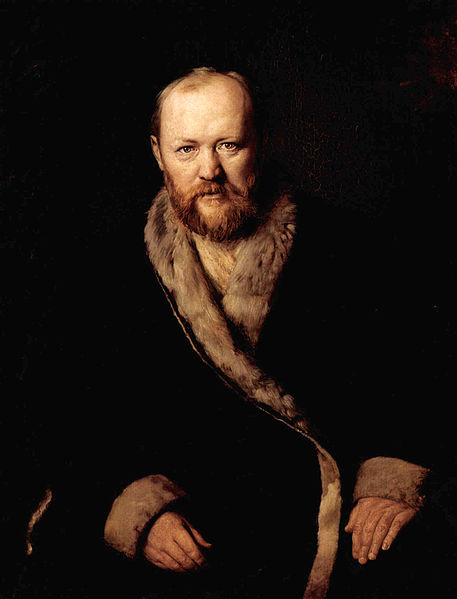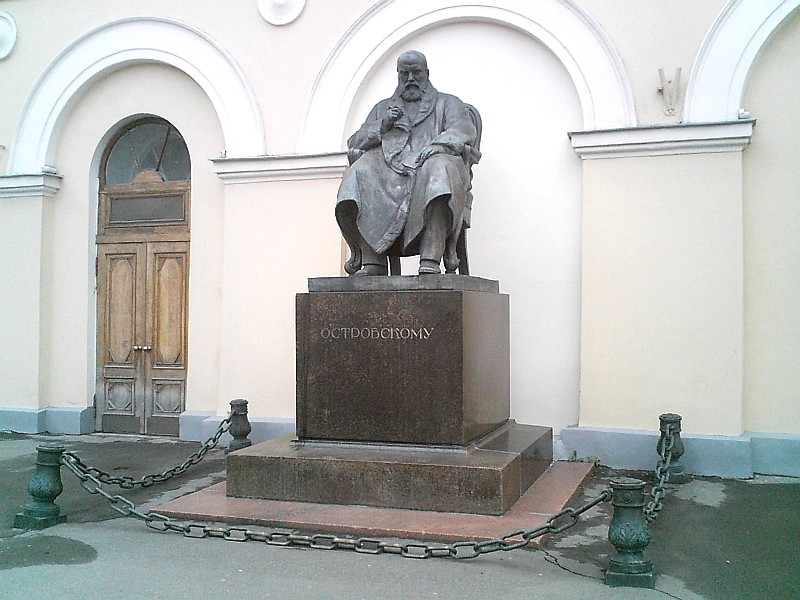<Back to Index>
- Mathematician Germinal Pierre Dandelin, 1794
- Playwright Aleksandr Nikolayevich Ostrovsky, 1823
- Secretary of State Henry Clay, Sr., 1777
PAGE SPONSOR


Aleksandr Nikolayevich Ostrovsky (Russian: Александр Николаевич Островский; 12 April [O.S. 31 March] 1823 – 14 June [O.S. 2 June] 1886) was a Russian playwright.
Ostrovsky graduated from the First Moscow Gymnasium (1835 - 1840) and then studied law at Moscow State University (1840 - 1843), which he left without having taken the final examination.
He was then employed as a clerk in the office of the Court of Conscience, and subsequently in that of the Commercial Court in Moscow. Both tribunals were called upon to settle disputes chiefly among the Russian merchant class, from which Ostrovsky was thus enabled to draw the chief characters for his earliest comedies. Among these are The Poor Bride (Bednaya nevesta), Poverty Is No Crime (Bednost' ne porok), and Don't Put Yourself In Another Man's Sledge (Ne v svoi sani ne sadis'). Of this last Nicholas I said it was not a play, but a lesson. The uncultured, self-satisfied merchant class is strikingly portrayed in The Tempest and Svoi lyudi - sochtyomsya!.
The last-mentioned comedy was prohibited for ten years, until the accession of Alexander II, and Ostrovsky was dismissed from the government service and placed under the supervision of the police.
The liberal tendencies of the new reign, however, soon brought relief.
Ostrovsky was one of several well known literary men who were sent into
the provinces to report on the condition of the people. Ostrovsky's
area of inquiry lay along the upper Volga, a part of the country memorable for some of the most important events in Russian history. This mission induced him to write several historical dramas of great merit, such as Kozma Zakhar'yich Minin - Sukhoruk (the full name of the famous butcher who saved Moscow from the Poles), The False Dmitriy and Vasily Shuisky, Vassilisa Melentieva (the name of a favorite court lady of Ivan the Terrible) and the comedy Voyevoda. Many of his later works treat of the Russian nobility, and include Beshaniye Dengi, Without a Dowry (Bespridannitsa), and Volki i Ovtsi; others relate to the world of actors, such as Les, Bez viny vinovatiy, and Talanty i Poklonniki. Ostrovsky enjoyed the patronage of Alexander III (his brother Mikhail was one Alexander's ministers and a member of the State Council of Imperial Russia), and received a pension of 3000 rubles a year. With the help of Moscow capitalists, he established the Maly Theatre as
a model theatre and school of dramatic art, of which he became the
first director. He also founded the Society of Russian Dramatic Art and
Opera Composers. Several
months before his death, he was appointed repertoire director of all
the state theatres in Moscow but because of his sickness had no time to
start the job. Ostrovsky died of stenocardia in his estate near Kostroma at his desk while translating Antony and Cleopatra by Shakespeare. Several of Ostrovsky's plays have been turned into operas, mostly by Russian composers. In particular, the play The Storm (Гроза) inspired many operas and other works. His early comedy Live Not As You Would Like To [Не так живи, как хочется] (1854) was adapted as the tragic opera The Power of the Fiend (premiered in 1871) by Alexander Serov. The historical drama The Voyevoda (Dream on the Volga) was transformed into two operas: one by Tchaikovsky (as The Voyevoda) and later another by Arensky entitled Dream on the Volga. Tchaikovsky also later wrote incidental music for a scene in the play. The most notable Russian opera based on an Ostrovsky play is Rimsky-Korsakov's Snow Maiden. Tchaikovsky also wrote incidental music for this play.